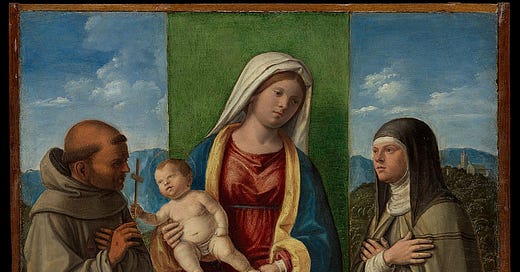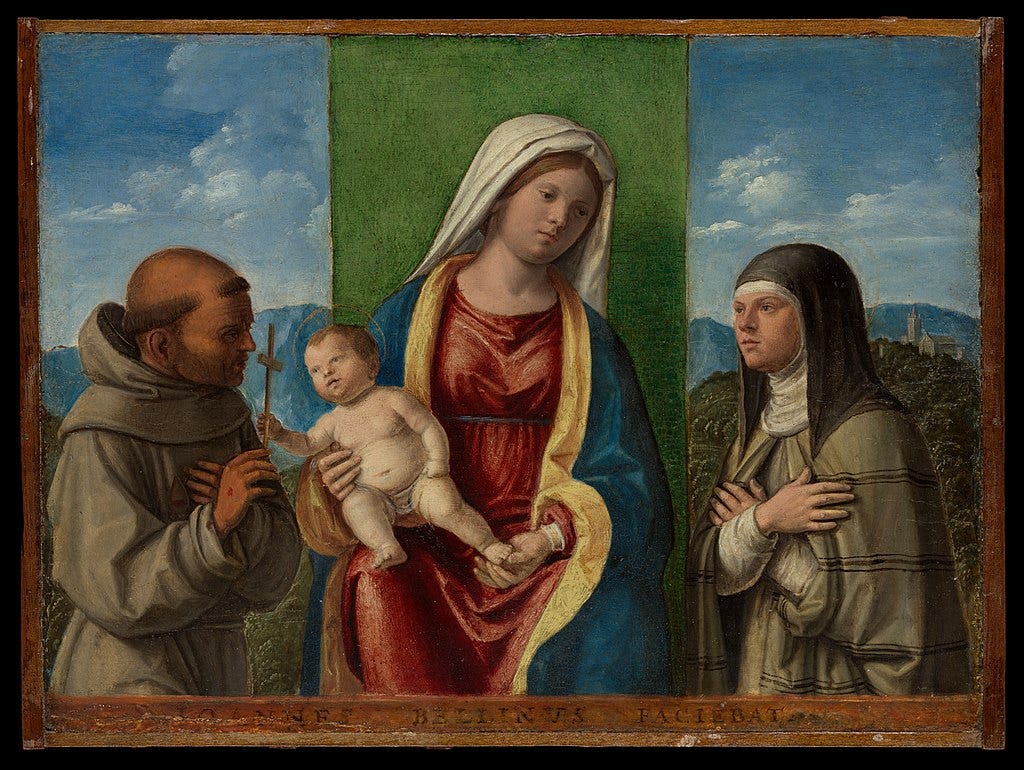Photo credit: Metropolitan Museum of Art, Giovanni Battista Cima da Conegliano, Madonna and Child with Saints Francis and Clare.
War changes things. Within Assisi, opposition between “old money” nobles, such as Clare’s family, and the “new money” merchants, such as Francis’ family, was virulent. When riots erupted in Assisi, Clare’s family took refuge in neighboring Perugia. The disparity between rich and poor was easier to see as a refugee. Clare was deeply moved.
When the battle engulfed both towns, aspiring knight Francis was imprisoned for over a year in Perugia, and later battled only illnesses instead of other knights. His dreams of glory dashed, Francis gradually found solace in simplicity and nature.
When marriage plans surfaced for her, Clare contacted Francis for advice. She had likely heard him preach in the plazas in Assisi.
Clare “followed” Francis, leaving her family home on Palm Sunday in 1212. However, her writings reveal her own independent, charismatic vocation. In Francis, she found a spiritual brother, in whom God had entrusted a parallel devotion to “Lady Poverty.”
After a few dramatic “rescue” attempts, Clare’s family accepted her vocation. Her simplicity and holiness attracted other young women, and even impressed a Bohemian princess so much that she started a similar convent. Their only contact with the world was through Francis and his followers, who pledged support to the poor ladies in a spirit of mutual love and unity. After all, they were brothers and sisters of the poor baby Jesus, who had nowhere to lay his head.
The dominant model for male-female relationships in Western culture is the parasite. Men and women use one another’s talents and weaknesses, jockeying for relative power and immediate gains. Because we are all weak, few are immune to this way of thinking about worldly success.
Both Francis and Clare turn power and prestige upside down by asserting the primacy of poverty. In this gospel model, we are receptive before we are active. The goodness within each human heart, and the goods we receive to preserve our lives are actually the gifts of God. The only thing we can actually be said to own is our sins and failings, our discomforts and disillusionments.
Everything else is actually given to us by God— resources, talent, zeal, opportunity and creativity are merely manifestations of God’s plan for us in the world. Thus, it is impossible for humans to be parasites, unless they accept a vision for their lives that is less than fully human.
The partnership of Francis and Clare points to this gospel vision of equality in a radical way. Both were rooted in a loving appreciation for our weaknesses, and a joyful trust in God’s strength to deliver us. Even in good partnerships, it happens that one sacrifices “more” than the other. The ideal is for each person to give without counting the cost, toward the good of the other. Sacrifices are offered as gifts, and counted as gifts by the other.
Francis and Clare were gifts to one another. They kept each other in check. Francis came back to San Damiano and saw that he was not crazy, that his Poverty ideal could be lived. And at the same time, he kept Clare from living it a little too well.
Clare was serious about being a servant. For example, Clare insisted on changing the mattress ticks for the sisters. Bugs were attracted by the white cloth that they stuffed with straw. It was disgusting work. But when she started filling her own mattress with twigs, Francis intervened and ordered her to stop.
Francis again interceded when Clare over-did the penitential fasting. Although it was voluntary, Francis understood the dangers of ascetical practice. Sometimes, you can fast (or abstain) for reasons that have more to do with ego, or pride in your own strength. Her health actually was already compromised by the rigors of the vocation she lived. For the sake of prudence, Francis reminded Clare that refusing the meager fare provided to the community was to refuse the good gifts of God.
There was a healthy give and take in the life-giving love that they shared. Clare held fast to their ideals, devoted to Lady Poverty and cultivating the community of nuns to follow her example. Francis provided limits and protection from the outside so that these same ideals remained life giving and not a source of death.
Both Francis and Clare turned the battle inward, shaking the human heart free of the things of this world that imprison souls. Their love of poverty wasn’t an impossible ascetical ideal, but a prophetic witness to the bounty of God’s love for us.
For those of us surrounded by the bounty of material things, it is a welcome reminder this Lent to “go to war” with our attachments and pride. Alongside Francis and Clare, we can learn what it means to be a gift of God to the world.





